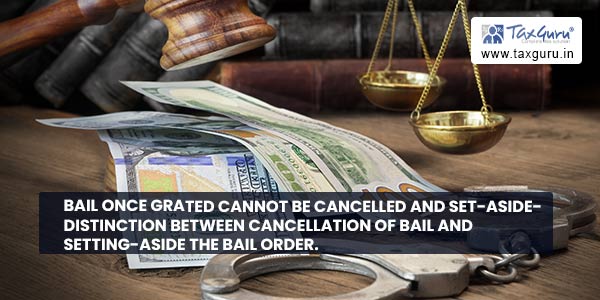The topic of bail cannot be discussed without taking into account this canon of criminal jurisprudence that ‘bail is the rule and jail is the exception’ laid down by Hon’ble Justice Vaidyanathapuram Rama Krishna Iyer in the matter of State of Rajasthan Vs Balchand alias Baliay [ 1977, 4 SCC 308].
The cancellation of bail is directly linked with personal liberty which is one of the cherished constitutional freedoms. The bail once granted cannot be cancelled in a mechanical manner without considering the post bail conduct of the accused and whether any supervening circumstances have rendered. The order of bail can be set-aside and annulled only by the superior courts when the order is unjustified, illegal and perverse. It is important to mention here that there is a distinction between cancellation of bail order and setting aside the order of bail.
This paper is a small attempt to demonstrate by relying the ratio settled by Hon’ble Supreme Court and Hon’ble High Courts that bail once granted cannot be cancelled and set-aside in mechanical manner. Further there is distinction between the concept of setting aside a bail order and cancellation of an order of bail.
CANCELLATION OF BAIL.
It is a trite law that consideration of an application for grant of bail stands on a different footing than one for cancellation of bail. The bail once granted to accused can be retracted in the grave and exacerbating circumstances and not in a mechanical manner. It cannot be retracted without considering the fact that whether the accused has misused the liberty of bail and whether any supervening circumstances has rendered it no longer conducive to a fair trail to allow the accused to retain the freedom he is enjoying.
The Hon’ble Supreme Court in the matter of State (Delhi Administration) Vs Sanjay Gandhi [ 1978 (2) SCC 411 ] held as under:
“Rejection of bail when bail is applied for is one thing; cancellation of bail already granted is quite another. It is easier to reject a bail application in a non-bailable case than to cancel a bail granted in such a case. Cancellation of bail necessarily involves the review of a decision already made and can by and large be permitted only if, by reason of supervening circumstances, it would be no longer conducive to a fair trial to allow the accused to retain his freedom during the trial”
The Hon’ble Apex Court in the matter of Dolat Ram and Ors Vs State of Haryana [Criminal Appeal No. 839 of 1994] has settled this ratio and held as under:
“Rejection of bail in a non-bailable case at the initial stage and the cancellation of bail so granted, have to be considered and dealt with on different basis. Very cogent and overwhelming circumstances are necessary for an order directing the cancellation of the bail, already granted..”
“However, bail once granted should not be cancelled in a mechanical manner without considering whether any supervening circumstances have rendered it no longer conducive to a fair trial to allow the accused to retain his freedom by enjoying the concession of bail during the trial”.
By relying the aforesaid both judgments passed by Hon’ble Supreme Court, the Hon’ble Delhi High Court in the matter of CGST, Delhi East Vs Naval Kumar [2021 (50) GSTL 449 (Del.)] has held as under:
“21. It is settled that once bail granted should not be cancelled in a mechanical manner without there being any supervening circumstances which are not conducive to fair trial. It cannot be cancelled on a request from the side of the complainant/investigating agency unless and until it is established that the same is being misused and it is no longer conducive in the interest of justice to allow the accused any further to remain on bail. No doubt, the bail can be cancelled only in those discerning few cases where it is established that a person to whom the concession of bail has been granted is misusing
The Hon’ble Delhi High Court in the matter of Charu Soneja Vs State of (NCT of Delhi) and Ors [CRL. MS 2050/2021] has held as under:
“17. There is a significant difference between an order rejecting an application for bail and an order for cancellation of bail. An order rejecting a plea for bail in non-bailable offences is in the discretionary domain of the Court and such a case can be decided without delving into details, it can be rejected simpliciter on the gravity of the offence and the perception that liberty, if granted, will be abused by the accused….”
The aforesaid judicial pronouncement makes very much clear that the bail cannot be cancelled in mechanical manner. it can be retracted only in exceptional circumstances when liberty has been misused.

SETTING ASIDE THE BAIL ORDER.
Similarly, the bail order can be set-aside and annulled by superior court when the same is unjustified, illegal or perverse and not in a mechanical manner. This concept is completely different from the cancellation order of bail on the ground that the accused has misconducted himself or because of some supervening circumstances.
The bail order is unjustified, illegal and perverse, where an order granting bail ignores material on record, passed without giving reason, reasons recorded contrary to the material on record, irrelevant materials have been taken into consideration etc.
The Hon’ble Supreme Courte in the matter of Puran, Shekhar and Anr Vs Rambilas & Anr [ Appeal (Crl) 599-600 of 2001] has held as under:
“………..One such ground for cancellation of bail would be where ignoring material and evidence on record a perverse order granting bail is passed in a heinous crime of this nature and that too without giving any reasons. Such an order would be against principles of law. Interest of justice would also require that such a perverse order be set aside and bail be cancelled. It must be remembered that such offences are on the rise and have a very serious impact on the Society. Therefore, an arbitrary and wrong exercise of discretion by the trial court has to be corrected”.
The Hon’ble Supreme Court while relying the Puran case (Supra) in the matter of Dr. Narendra K Amin Vs State of Gujarat [ Appeal Criminal No. 740 of 2008] held as under:
“13. The perversity as highlighted in Puran’s case (supra) can also flow from the fact that as noted above irrelevant materials have been taken into consideration adding vulnerability to the order granting bail. The irrelevant materials should be of a substantial nature and not of a trivial nature…”
Conclusion:
The parameters in regard to cancellation of bail and setting aside the order of bail is no more res integra and there is distinction between parameters of setting aside of bail order and cancellation of bail.
As state above, personal liberty is one of the cherished constitutional freedoms, the cancellation of bail and setting aside the bail order is directly affect the same. The cancellation of bail and setting aside the order of bail can be done in exceptional circumstances as elaborated above.





